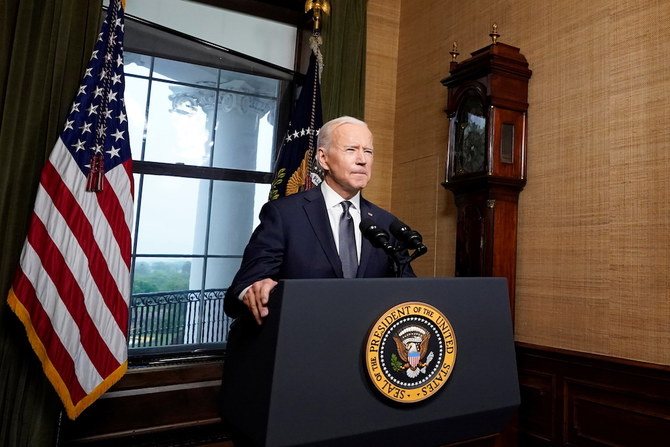As US withdraws, new players to dominate Afghan scene

https://arab.news/4ywy2
President Joe Biden this week publicly declared that all remaining US troops in Afghanistan will be withdrawn by Sept. 11 this year. This date recalls the 2001 assault on the US homeland and the distinct symbols of its power — financial, military and political — by Afghanistan-based extremist forces (Al-Qaeda, backed by the Taliban), who caused the deaths of about 3,000 Americans and inflicted a body blow to America’s global standing.
The US and its allies deployed about 150,000 soldiers to Afghanistan in an effort to defeat the extremist militants in their “Global War on Terrorism” and promote a democratic order in the country. However, within a few years, the Taliban were back in Afghanistan and, by the end of the decade, controlled more than 60 percent of its territory. Several thousand Afghan soldiers and even more civilians have been killed in the 20-year conflict.
Former President Donald Trump recognized the futility of the continued US presence and directed his officials to negotiate with the Taliban a withdrawal from the country. This was achieved through last year’s Doha Agreement. It provided for the Taliban abjuring violence, de-linking from Al-Qaeda, and entering into discussions with the Kabul government to take forward a political process based on power-sharing in a democratic framework. In return, the US agreed to leave Afghanistan by May 1, 2021.
The Doha Agreement failed very quickly: The Taliban did not fulfill any of its commitments, while the intra-Afghan dialogue could not even agree on an agenda. Since Biden entered the White House in January, his principal foreign policy effort has been to end America’s intervention in a country that history teaches us is the “graveyard of empires.” This week’s announcement fulfills that commitment.
A few weeks ahead of Biden’s announcement, Secretary of State Antony Blinken wrote to Afghan President Ashraf Ghani to urge him to accept a three-year transitional government, in which the Taliban would have half the political positions. A UN-sponsored conference — attended by Russia, China, Iran, India and Pakistan — would endorse the political agreement that would enable Afghan politicians to revise the constitution, while using the existing document as an “initial template.”
The UN-sponsored event was to take place in Turkey from Friday, but it has been postponed; the Taliban refused to attend as its leaders are still studying Blinken’s proposals. The only matter on which they want clarity, their spokesman said, was the issue of the US withdrawal. Here they have comfort from an American official, who emphasized that the fresh deadline of Sept. 11 “is set in stone” and is not “conditions-based.”
What, then, is the outlook for Afghanistan? It is difficult to attach any value to the proposed UN conference. The robust hostility of the Biden administration toward Russia, China and Iran in the three months he has been in office suggests that the three countries have no incentive to back the US agenda. Pakistan has supported the Taliban for 30 years now and is keen to see it in power in the country.
India has consistently backed the democratic process in Afghanistan and the elected leaders in Kabul. It has sought to contribute to national welfare by investing heavily — to the tune of $3 billion — in national development projects. New Delhi has also firmly avoided engagement with the Taliban, as it has found its belief system obscurantist and its politics abhorrent.
In the post-US scenario, it is likely that the principal role-players in Afghan politics will be Russia and China, with Pakistan as their ally. China, with Pakistan’s help, has built ties with the Taliban since 2010 and sees Afghanistan as an important part of its Belt and Road Initiative. Beijing is said to have offered the Taliban substantial investments in infrastructure and energy projects to ensure peace in Afghanistan after America’s departure.
Russia’s interest in Afghanistan was ignited eight years ago by the presence of Central Asian militants among Daesh’s newly emerged Khorasan branch. This led Moscow to engage with Taliban leaders, who were hostile to Daesh, and also host talks between the Afghan politicians. As Russia’s ties with the Taliban have deepened, there are suggestions it could emerge as the principal negotiator in intra-Afghan disputes.
It is likely that the principal role-players in Afghan politics will be Russia and China, with Pakistan as their ally.
Talmiz Ahmad
Looking at the future of the country, it is important to recall that Afghanistan has consistently been in the throes of conflict since 1978. The Taliban, in fact, emerged as a fighting force only because, after the Soviet withdrawal of 1988-89, the country’s mujahideen leaders could not agree on a power-sharing deal among themselves and condemned the country to prolonged civil conflict until 1994. It is difficult to believe that Afghan political leaders will now follow the path of moderation and mutual accommodation.
On the positive side, the Taliban has evolved over the last two decades — it is now divided into several factions, with diverse leaders, many of whom have an accommodative approach and support the peace process. Thus, post-US Afghanistan is likely to have a Taliban-dominated political order, but one that, while not democratic in the conventional sense, will be more moderate than the “emirate” of the 1990s.
- Talmiz Ahmad is an author and former Indian ambassador to Saudi Arabia, Oman and the UAE. He holds the Ram Sathe Chair for International Studies at Symbiosis International University in Pune, India.









































